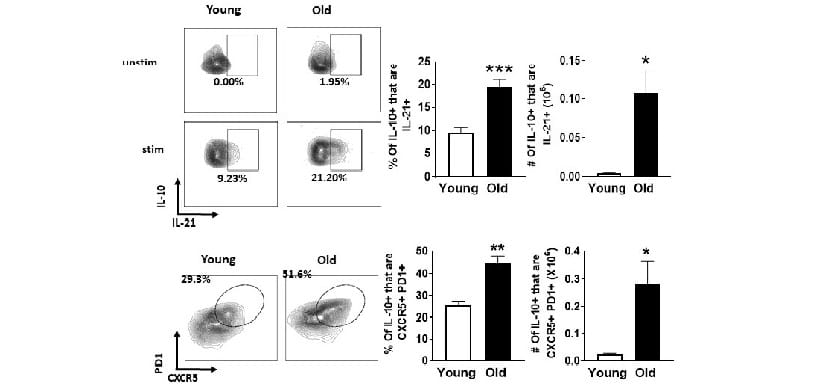
About
Biography
My lab is interested in understanding mechanisms underlying lymphocyte development, homeostasis and function. We are studying these processes in the context of aging, infection and vaccination as well as transplant rejection.
Our long-term goal is to identify molecular mechanisms that can be exploited to boost immunity, such as vaccine responsiveness. The mechanisms could also be manipulated to decrease auto-immunity or allo-immunity like autoimmune disease, transplant rejection or allergic reactions.
One of the reasons I love doing immunology research is because I learn new things about the complexity of the immune system and how it has developed to provide protective immunity while avoiding autoimmunity. Beyond the outstanding research environment, phenomenal PhD program, and the cutting-edge core facilities, another reason for doing research at the Cincinnati Children’s Hospital Medical Center is the collaborative environment.
For example, our work on aging has been a close collaboration between my lab and Dr. Claire Chougnet’s lab. Furthermore, our research in transplantation started as the result of a phone call from a world-renowned transplant surgeon at the University of Cincinnati about joining forces on T-cell mediated kidney rejection.
One of the most notable findings my team and I have uncovered includes a function for the pro-apoptotic molecule Bim in driving the “crash” of T-cells after the pinnacle of an immune response. We also discovered a common gamma chain cytokine/STAT5/Bcl2 network that antagonizes Bim and is needed for developing protective T-cell memory.
I am a Fellow of the Graduate School at the University of Cincinnati, the PI of a T32 Training Grant, and served as a permanent member of the Cellular and Molecular Immunology-B National Institutes of Health (NIH) study section as well as Chair of several NIH study sections.
I have more than 20 years of experience in the immunology field and started working at Cincinnati Children’s Hospital Medical Center in 2002. My research has been published in many journals, including PNAS, Science Advances, Cell Death and Differentiation, and American Journal of Transplantation.
PhD: University of Wisconsin-Madison, Madison, Wisconsin, 1997,
Interests
T cells; autoimmunity; sex differences in immune responses; apoptosis
Interests
Molecular factors that control the decision between tolerance and immunity within T lymphocytes; staphylococcal enterotoxins, recombinant vaccinia viruses, lymphocytic choriomeningitis virus and MHC tetrameric reagents; antigen -specific T cell responses; tolerance centers on regulation of mechanisms that control the survival and death of activated T cells in vivo, namely Bcl-2 and its antagonist Bim; manipulation and regulation of antigen-specific T cell responses via novel vaccine strategies to either induce tolerance or enhance immunity; mechanisms underlying sex-based differences in T cell responses and how these differences relate to autoimmune disease.
Research Areas
Publications
Daytime SHP2 inhibitor dosing, when immune cell numbers are elevated, shrinks neurofibromas. Life Science Alliance. 2025; 8(12).
RNA helicase DDX3X promotes NK cell survival by supporting MCL1 expression. Journal of Immunology. 2025; 214(12):3218-3227.
Bile acids engage the SIPR-STAT3 signaling axis to modulate regulatory T cell responses in fibrosing cholangiopathies. Journal of Hepatology. 2025; 83(5):1128-1141.
Single-cell transcriptional landscape of liver transplant rejection reveals tissue persistence of clonally expanded, treatment-resistant T cells. American Journal of Transplantation. 2025; 25(11):2345-2360.
Serum Soluble Mediator Signatures of Lupus Nephritis: Histologic Features and Response to Treatment. Arthritis Care and Research. 2025.
Blood immunophenotyping identifies distinct kidney histopathology and outcomes in patients with lupus nephritis. Journal of Clinical Investigation. 2025; 135(16).
Integration of scRNAseq Analyses of Kidney and Liver Allograft Rejection Enables Identification of Common and Unique Characteristics. American Journal of Transplantation. 2025; 25(8):s304.
Multiome Sequencing of Chronic Ductopenic Rejection Reveals Roles for Th2 Immunity and Activated Fibroblasts in Cholangiocyte Injury. American Journal of Transplantation. 2025; 25(8):s245.
Single-Cell RNA/TCR Sequencing: Do Urinary CD8+ T Cell Populations Accurately Reflect Transcriptional Profiling of Allograft Infiltrating CD8+ T Cell Populations? American Journal of Transplantation. 2025; 25(8):s8-s9.
Leveraging Heterologous Immunity to Provide Insights into Alloreactivity. American Journal of Transplantation. 2025; 25(8):s94.
From the Blog
Research Reveals Novel Insights into Transplant Rejection and New Drug Development Targets
David A. Hildeman, PhD6/28/2023
New Concept for Boosting Flu Vaccine Power Also Might Apply to Future COVID-19 Vaccines
David A. Hildeman, PhD7/29/2020





